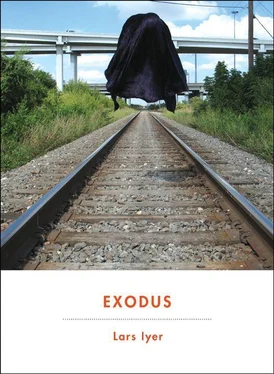Badiou has already had several thoughts concerning his defence of Maoism, and looked over the English translation of one of his plays. He’s already skim-read articles from a dozen international newspapers, and caught up with his emails, replying to Žižek, writing to Jacques Rancière. He’s already written a brief blurb for a forthcoming book by Jean-Luc Nancy (much better than my blurb for Jean-Luc Nancy, W. says). He’s already jotted down the points he wants to cover in his open letter on behalf of the poor of the Paris Banlieus, which he means to send to Le Monde .
Badiou has already had his coffee and croissant, and a freshly squeezed orange juice, and sat out on his terrace in his shirtsleeves, taking in the morning sun, turning over his latest ideas in his head. How many thoughts has he had since he got up? Countless thoughts! How many notions, waiting to coalesce? Countless notions!
How much outrage does Badiou feel, really feel, at the triumph of the right in France? Great outrage! How much horror does he feel at the dreadful plight of the poor? Enormous horror! But Badiou acts on his outrage and his horror. He writes polemical articles to publish in mainstream papers. He circulates petitions and strides out onto the streets.
Ah, how many demonstrations has Badiou seen? How many street-battles? How many cobblestones has he torn up from the ground to throw at police? How many truncheons have bounced off his head? He can remember Althusser as a contemporary, Balibar as a whippersnapper. He remembers the Maoist Barthes, the Maoist Kristeva just home from China … And he remembers the Restoration of the ’80s, when every leftist dream was lost.
But what would Alain Badiou make of us? What would he conclude? Enemies, he would think. No, not even that, Badiou would think. — ‘ Pas enemies. Les tosseurs ’. But perhaps he wouldn’t think anything at all. Perhaps he’d just look through us, as if, like evil for Plato, we didn’t really exist.
For the mathematical philosopher, vagueness doesn’t exist, not really; it’s only a deficiency of precision. And for the political philosopher, pathos doesn’t exist, except in the glint of starlight, impersonal and remote, on the eyeglasses of the militant, hurling bricks at the police.
The loos aren’t working, I tell W. on the train out of London. They’re blocked up with toilet roll. — ‘Go and unblock them!’ W. says. ‘Do your bit for redemption!’
W. recalls what happened on the bus to Memphis, on our doomed Dogma lecture tour of America. We’d headed to the back seats, by the toilet. You get less travel-sick there, that was my reasoning. And you can watch everyone, you can see what’s going on. W. was happy to be led.
But something terrible must have happened in the toilet, we realised slowly. The smell! My God! W. berated himself. Why does he always follow me into the teeth of the catastrophe?
A passenger gasped and crossed herself when she opened the toilet door. — ‘Don’t do it!’, we told her. But she came back a moment later with a portable air freshener, holding it out before her as she opened the door, and spraying it in the sign of the cross.
Minutes passed. We heard humming from inside. And then she emerged, smiling. She’s cleaned the loo, said W. She’s cleaned it, for us. For everyone! We sat in awe. That’s sainthood, said W.
It is small kindnesses that redeem history, W. says. Small kindnesses — that’s all we have left as the great machines grind on all about us. The great political machines, the great economic machines. The great machines of regeneration …
Small kindnesses, W. says. The miracle of goodness, which appears only in isolated acts, in stupid, senseless generosity, in the kind of gratuitous altruism that you find in Russian novels, in the holy idiots of Dostoevsky and Grossman …
He wishes I were a holy idiot, W. says, and not just an idiot. He wishes I would show a Dostoevskian innocence or a Grossmanian selflessness. He wishes I were an unworldly man, instead of being all too worldly, super -worldly, W. says.
W. sees me in his mind’s eye wandering barefoot and almost naked in the severest frosts, driving away all self-love and pride, and seeking to evoke nothing but contempt in my fellow human beings, all the while cultivating love for my enemies and persecutors. He sees me voluntarily taking on humiliation and insults to achieve the proper depth of meekness and goodness of heart. He imagines me as a fool for Christ , living in patience and unceasing prayer …
And when he comes to? There I am, before him again, a fool for no one, an idiot for no cause. There I am, having rejected all dignity, all self-love and pride, having accepted humiliation and insults, and evoking nothing but contempt in my fellow human beings because I cannot do otherwise …
There was only one moment in W.’s life when he showed great compassion, he says.
It was snowing, he remembers. No one was on the campus. No one except W., who had gone there to prepare his defence against his redundancy. Who else would have come into work on such a day?
He met her by chance, he says, as he rounded a corner. She stumbled into him, having slipped on the ice — he caught her, stood her up, and recognised her as the manager who had put his name forward to be sacked.
As she faced him, he saw tears in her eyes. She was crying — why? She opened her mouth to speak. She paused. And then she said, ‘It was nothing personal’.
It was nothing personal . But of course it was something personal! She’d singled him out from all his colleagues. Sack W.! she’d told the redundancy committee.
Tears brimming in her eyes … The frosty air … The deserted campus … Ice everywhere, as in bleakest Siberia … And what did he do, W., to his oppressor? What, to one who deserved no quarter? He embraced her, he says. He put his arms around her, like one of Dostoevsky’s idiots.
He was brought up to be compassionate, W. says. He was brought up to show mercy and forgiveness. And so he embraced her, there in the snow. — ‘Everything’s going to be okay …’
Oxford. The dreaming spires. We’re in enemy territory , we agree. We’ve been parachuted deep behind enemy lines. It’s a suicide mission. A soiling-ourselves mission. — ‘Go on, you start’.
Oxford! Why do we come here? Why, year after year? W. feels as though he’s suffocating, he says. As though he can’t breathe and his hands are clawing the air. Being buried alive is bad enough, W. says, but being buried alive with an idiot! At least I should amuse him. At least I should do something funny. But Oxford is too much even for me. It’s like going around with a sulky ape.
Why does Oxford always make him think of Poland? W. wonders. It’s dialectics, he says. It’s because Poland is the opposite of Oxford. Because Poland is a place of thought, a place where thought is valued, and Oxford is a place without thought, a place where thought is despised.
Poland: that’s where it all began, so many years ago, we agree. Our collaboration, our dog and pony show.
Is there such a thing as friendship at first sight? , W. wonders. Well, that’s what happened in Poland, in Wrocław, when he saw my Adam Ant dancing : friendship at first sight.
Ah, he still remembers it, W. says: in the middle of the meal held in honour of the British delegation in Wrocław, I pushed back my chair to demonstrate Adam Ant dancing . He remembers when I took to the dancefloor, recreating Adam Ant dancing from the Prince Charming video. And he remembers how the Polish postgraduates followed me; how they, too, pushed back their chairs and took to the dancefloor, likewise recreating Adam Ant dancing from the Prince Charming video.
Читать дальше












